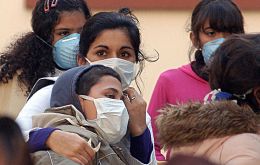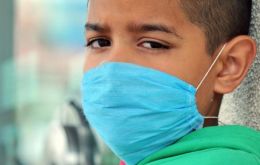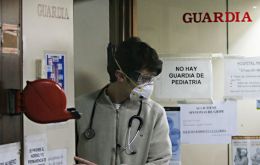MercoPress. South Atlantic News Agency
Health & Science
-
Thursday, July 9th 2009 - 12:46 UTC
New mix of hogs and seasonal flu detected in Canadian farm

Two farm workers in Western Canada have become infected with a new flu virus, health officials said this week, emphasizing the strain, described as non-pandemic influenza A virus, was not related to the H1N1 pandemic.
-
Tuesday, July 7th 2009 - 10:29 UTC
Bolivia considering closing border with Argentina because of the flu

Bolivia is considering temporarily closing part of its extended border with Argentina, (773 kilometres long), because of the outbreak and quick spread of the A/H1N1 virus flu in that country, anticipated Health minister Ramiro Tapia over the weekend.
-
Tuesday, July 7th 2009 - 10:01 UTC
Possible first death of Norovirus on cruise vessel

A man has died and more than 150 people have taken ill on board a cruise liner berthed in Invergordon, Easter Ross, Scotland. The vomiting bug, norovirus, is thought to have taken hold on the Marco Polo, which is touring the UK and Ireland with about 800 passengers and 350 crew members.
-
Monday, July 6th 2009 - 13:02 UTC
A/H1N1 flu deaths in Argentina climb to 62

Argentine authorities confirmed Sunday that the number of A/H1N1 virus flu official deaths had risen to 62 on Sunday, (55 on Saturday) while on Monday becomes effective the decision to begin the schools and universities recess, in a desperate effort to try and contain the spread of the disease.
-
Sunday, July 5th 2009 - 11:53 UTC
Argentina confirms 55 deaths from the A/H1N1 virus flu

Argentina’s minister of Health Juan Manzur confirmed on Saturday that the number of deaths from the A/H1N1 virus influenza had reached 55, although non government organizations insist the number is higher.
-
Saturday, July 4th 2009 - 08:19 UTC
A/H1N1 virus “unstoppable”; vaccine access a “political question”

The United Nations top health official opened a forum in Mexico on combating the A/H1N1 flu saying that the spread of the virus worldwide is now “unstoppable”. World Health Organization head Margaret Chan added that the holding of the meeting in Cancun showed confidence in Mexico, which has been hard hit.
-
Friday, July 3rd 2009 - 13:52 UTC
Argentina reports 44 deaths; highest A/H1N1 virus flu mortality rate

Argentine health officials reported 17 more H1N1 flu deaths, bringing the total to at least 44 in the country hardest hit by the A/H1N1 virus in the southern hemisphere. Health Minister Juan Manzur said that “between 43 and 44 deaths” linked to the virus had been confirmed, a significant jump from the 26 that had been reported by the ministry on Friday.
-
Friday, July 3rd 2009 - 06:44 UTC
UK concedes pandemic can’t be contained and changes to “new treatment”

The rising numbers of A/H1N1 virus flu cases mean trying to contain the virus is no longer an option says the British government says, reports BBC.
-
Wednesday, July 1st 2009 - 13:00 UTC
Argentina: health emergency and school vacations extended to fight the flu

Authorities in Buenos Aires City and Buenos Aires province declared health emergencies on Tuesday and extended school vacations as the country’s death toll of A/H1N1 virus influenza surged to 35.
-
Tuesday, June 30th 2009 - 15:03 UTC
Uruguay reports first death of A/H1N1 virus influenza

Uruguay confirmed the first death of the A/H1N1 virus influenza and two more hospitalized cases, which have been described as in “critical situation”. The victim is a 60 year old woman who died in a government managed hospital on Monday